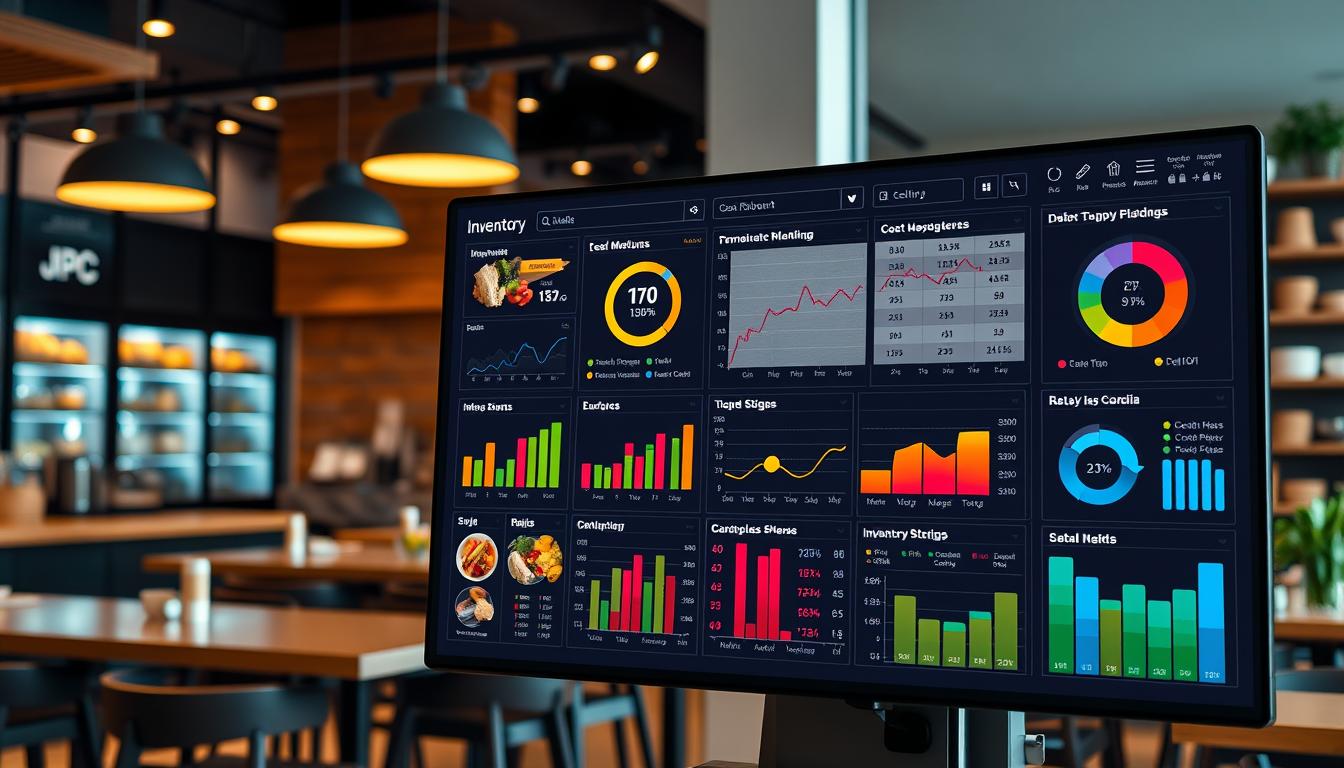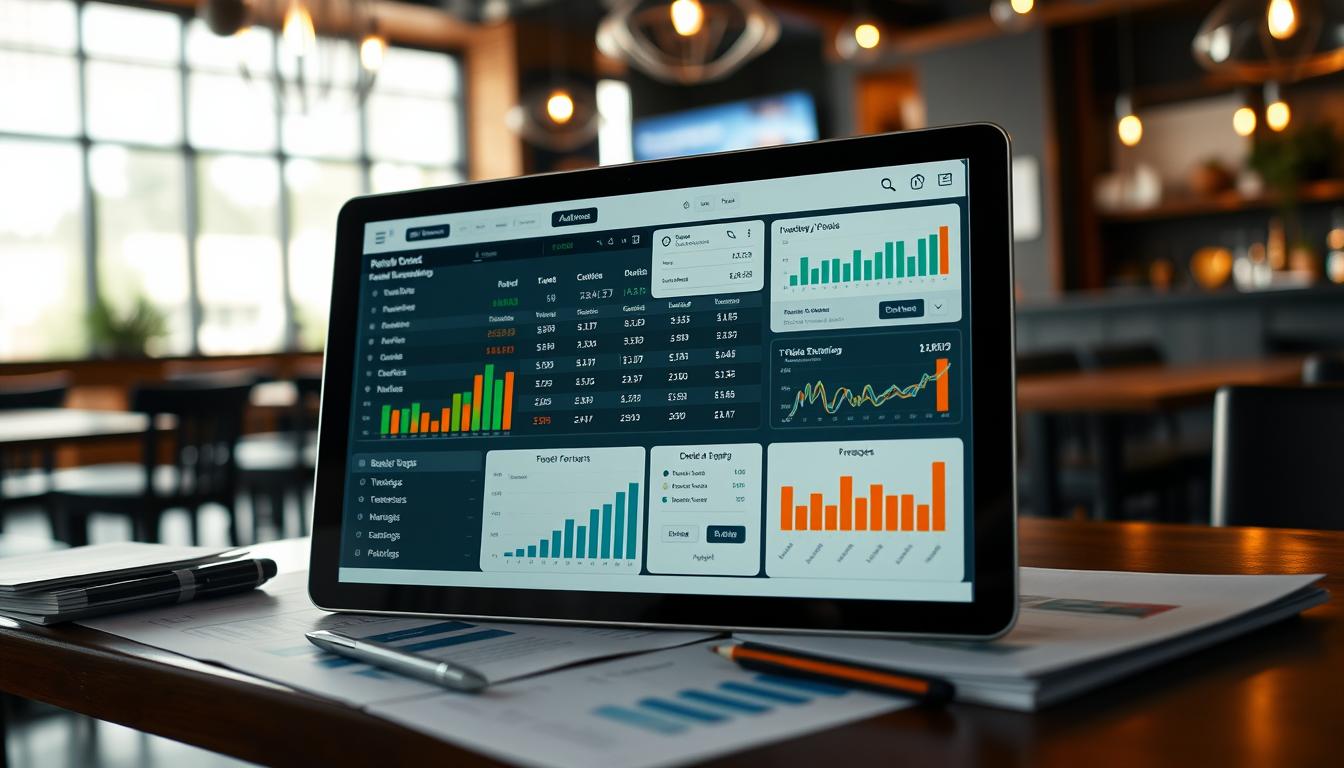Accounting Services For Restaurants & Hospitality Industry
In the UK's restaurant and hospitality sector, businesses face a complex financial world. They must handle payroll, inventory, and follow rules. This guide offers advanced accounting solutions for these challenges.
These solutions help businesses run smoothly, make more money, and stay competitive. They are made just for the restaurant and hospitality industry.

Key Takeaways
- Discover modern financial management techniques designed for the unique needs of the restaurant and hospitality industry.
- Explore cloud-based accounting technologies that provide real-time financial tracking and mobile access.
- Learn about the integration of point-of-sale (POS) systems with accounting software for seamless data flow.
- Understand the critical financial metrics that drive success in the restaurant and hospitality sector.
- Discover specialised accounting services tailored to the restaurant and hospitality industry.
Understanding Modern Restaurant Financial Management
In today's competitive hospitality world, managing finances well is key to success. Restaurant accounting software and hospitality solutions have changed how owners and managers handle money. This part talks about the main parts of restaurant accounting, why financial reports are important, and the rules restaurants must follow.
Key Components of Restaurant Accounting
Good restaurant accounting includes managing payroll, tracking inventory, controlling costs, and watching revenue. With restaurant accounting software, owners can make these tasks easier. This helps keep records right and makes decisions better.
Financial Reporting Basics
It's vital to report on a restaurant's finances regularly. Reports like the income statement, balance sheet, and cash flow statement show how well a restaurant is doing. Knowing how to use these reports is key for good hospitality accounting solutions.
Regulatory Compliance Requirements
The restaurant world has many rules to follow, like VAT, business rates, and labour laws. Following these rules is not just legal; it helps a business last long. Keeping up with these rules is a big part of managing a restaurant's finances today.
| Key Components of Restaurant Accounting | Financial Reporting Basics | Regulatory Compliance Requirements |
|---|---|---|
|
|
|
Knowing about restaurant financial management helps owners use restaurant accounting software and hospitality accounting solutions well. This improves finances, follows rules, and leads to success in the long run.
The Evolution of Hospitality Accounting Systems
The hospitality industry, including hotels, restaurants, and food services, has seen big changes in managing money. This section looks at how hotel accounting systems and accounting for food and beverage businesses have changed with technology.
Before, these businesses used old, paper-based accounting methods. These were slow, full of mistakes, and hard to see what was happening in real time. But now, thanks to digital changes, there are smarter hotel accounting systems and new ways to manage money.
Now, businesses can use cloud-based accounting software that works with their POS systems. This makes managing money easier. They can see their income, costs, and stock levels in real time. This gives them a clear picture of their finances anytime.
Also, mobile-friendly accounting apps let professionals manage money anywhere. This helps them make quick decisions and keep a tight grip on finances. This tech change has changed how food and beverage businesses handle their money. It lets them focus on great customer service while keeping their finances strong.
"The hospitality industry's embrace of digital accounting solutions has revolutionised the way we manage our finances, enabling us to make informed decisions and drive profitability like never before."
The hospitality industry is always changing, and so are hotel accounting systems and accounting for food and beverage businesses. These advancements will be key in shaping the future of managing money in the sector.
Cloud-Based Solutions Transforming Restaurant Accounting
In the fast-changing restaurant world, cloud-based accounting is making a big difference. It helps businesses manage their money better. This technology lets owners make smarter choices, work more efficiently, and see their finances clearly in real-time.
Benefits of Cloud Technology
Cloud-based accounting has many benefits for restaurants. It keeps data safe, updates software automatically, and makes teamwork easy. This means owners and their teams can check important financial info anytime, anywhere. It also helps businesses focus on what they do best by simplifying accounting tasks.
Real-time Financial Tracking
One big plus of cloud-based accounting is tracking money in real-time. Owners can watch cash flow, sales, and expenses easily. This helps them make quick, smart choices. In the quick world of hospitality, being fast and flexible is key to success.
Mobile Access and Control
Cloud-based accounting lets owners manage money from anywhere. They can use apps or websites to check finances, approve bills, and handle daily tasks. This means they can keep their business's money safe and in control, no matter where they are.
| Feature | Benefit |
|---|---|
| Secure Data Storage | Safeguard sensitive financial data with robust cloud-based security measures |
| Automated Updates | Ensure your accounting software is always up-to-date, eliminating the need for manual updates |
| Collaborative Capabilities | Enable seamless teamwork and real-time information sharing among restaurant staff |
By using cloud-based accounting, restaurants can manage their money better. They can make better choices, work more efficiently, and stay competitive in the fast-paced hospitality world.
POS Integration with Accounting Software
In the fast-paced restaurant and hospitality world, linking Point of Sale (POS) systems with pos integrated accounting and restaurant accounting software is a big leap forward. This connection helps restaurant owners and managers manage their finances better. It makes their operations smoother, more accurate, and gives them insights to grow their business.
One major advantage of POS-accounting integration is how it automates data sharing. When a customer orders at the POS, all the financial details like sales, inventory, and labour costs are updated in the accounting software right away. This means no more manual data entry, fewer errors, and more time saved.
- Improved data accuracy and real-time financial visibility
- Streamlined invoicing and accounts receivable management
- Enhanced inventory tracking and cost control
- Simplified payroll and labour cost management
In the UK's hospitality industry, popular POS-accounting integrations include Lightspeed, Revel Systems, and Quoteroller. These systems link key business functions together. This lets restaurant owners make better decisions and improve their financial health.
"POS integration with accounting software has been a game-changer for my restaurant. I now have a comprehensive view of my finances, which helps me make smarter decisions and stay on top of my business."
By using pos integrated accounting and restaurant accounting software, restaurants and hospitality businesses can manage their finances better. This leads to more efficiency, a competitive edge, and success in the market.
Essential Financial Metrics for Restaurant Success
In the fast-paced restaurant world, keeping an eye on key financial metrics is key. This ensures ongoing profit and growth. Three vital metrics for restaurant success are the Cost of Goods Sold (COGS), Labour Cost Management, and Profit Margins Analysis.
Cost of Goods Sold (COGS)
COGS is the direct cost of making food and drinks in a restaurant. It's critical to accurately track and control COGS for a healthy profit. Restaurant owners must watch inventory, reduce waste, and buy smart to cut COGS and boost profits.
Labour Cost Management
Labour costs, like wages and benefits, are a big expense for restaurants. Managing labour costs well means smart scheduling, monitoring productivity, and the right staff. This helps keep costs in check and boosts overall financial health.
Profit Margins Analysis
Looking at profit margins gives deep insights into a restaurant's health. Owners should check gross, operating, and net profit margins often. This helps spot areas for improvement, like menu prices and cost control. It's all about making data-driven decisions for better profits and sustainability.
By closely tracking and analysing these key metrics, restaurant leaders can make better choices. They can improve operations and achieve more financial success in the competitive accounting for food and beverage businesses and restaurant financial management world.
| Financial Metric | Description | Importance for Restaurants |
|---|---|---|
| Cost of Goods Sold (COGS) | The direct costs associated with producing the food and beverages served in a restaurant. | Minimising COGS is crucial for maintaining healthy profit margins. |
| Labour Cost Management | Includes wages, benefits, and payroll taxes for restaurant employees. | Optimising labour costs is essential for enhancing overall financial performance. |
| Profit Margins Analysis | Examining gross, operating, and net profit margins to identify areas for improvement. | Profit margin analysis provides valuable insights for maximising profitability and long-term sustainability. |
"Mastering the key financial metrics is the foundation for running a successful restaurant business. These metrics provide the data-driven insights needed to make smart, informed decisions."
Accounting Service for Restaurants and Hospitality Industry
The hospitality industry is fast-paced and challenging. Managing finances in restaurants or hotels can be tough. Specialised accounting services for the hospitality industry offer great help. They help businesses manage their finances better and grow.
Using hospitality industry accounting services means getting a wide range of help. You get everything from bookkeeping and financial reporting to strategic financial planning and tax compliance. These experts can adjust their services to fit your business's needs.
- Accurate and timely financial record-keeping
- Detailed financial statements and reporting
- Compliance with industry-specific regulations and tax requirements
- Budgeting and forecasting for better decision-making
- Payroll management and employee benefits administration
- Inventory tracking and cost control
Working with accounting service for restaurants and hospitality industry saves time and resources. It lets businesses focus on what they do best. With the right financial insights, they can make better decisions and grow.
"Partnering with a specialised hospitality industry accounting service has been a game-changer for our restaurant. We now have complete visibility into our financial performance and can make data-driven decisions to improve profitability." - Samantha, Owner of The Lemon Grove Restaurant
Whether you run one restaurant or many, accounting service for restaurants and hospitality industry is here to help. They offer the expertise needed to succeed in the industry and reach your financial goals.

Streamlining Payroll Management in Hospitality
In the fast-paced hospitality world, managing payroll is a big challenge. Restaurants and hotels deal with tips, employee benefits, and many labour laws. But, with accounting outsourcing for restaurants or hospitality accounting solutions, they can make payroll easier and stay legal.
Tips and Gratuity Handling
Tips and gratuities are key in the hospitality industry. Tracking and distributing these can be hard. But, outsourced accounting makes it simpler. They create systems for fair tip distribution and keep records for taxes and laws.
Employee Benefits Administration
Good employee benefits are important for keeping staff in the hospitality sector. Tasks like pension, health care, and holiday pay can be a lot. Outsourcing to accounting outsourcing for restaurants or hospitality accounting solutions helps manage these. This way, businesses can focus on what they do best while keeping up with UK laws.
Using outsourced accounting services can make payroll easier for hospitality businesses. It saves time and lets them focus on other important parts of their work.
Inventory Management and Cost Control
In the fast-changing restaurant and hospitality world, managing inventory and costs well is key to making money over time. Restaurant accounting software has changed how food and drink businesses handle these important money matters. It helps them run smoother and make more money.
Keeping track of stock, cutting down on waste, and buying smart are key for accounting for food and beverage businesses. New cloud-based tools give real-time views of stock. This lets restaurant owners make smart choices to avoid waste and use up fresh items better.
- Automated inventory tracking and alerts to monitor stock levels
- Precise recipe costing and waste management to control COGS
- Intelligent purchasing recommendations based on historical consumption patterns
By linking restaurant accounting software with their POS systems, businesses get a full view of their work. From sales to stock, it all comes together. This makes accounting easier and gives deep insights into the business's health.
| Metric | Importance | How Software Helps |
|---|---|---|
| Cost of Goods Sold (COGS) | Crucial for understanding profitability and pricing | Automated tracking and analysis of ingredient costs |
| Inventory Turnover Ratio | Indicates the efficiency of inventory management | Real-time visibility into stock levels and consumption patterns |
| Spoilage and Waste | Directly impacts profitability and sustainability | Alerts and reporting to minimise waste and optimise ordering |
With restaurant accounting software, food and drink businesses can stay ahead. They can manage inventory and costs better. This leads to more profit and success in the long run.

Tax Compliance and Planning for Restaurants
In the fast-paced hospitality world, understanding tax compliance and planning is key for restaurant owners. This includes VAT, managing business rates, and deductions. Knowing these details can greatly improve your restaurant's financial health.
VAT Considerations
VAT is a big deal for UK restaurants. It's important to know about VAT registration, rates, and reporting. Keeping up with VAT rules and getting expert advice can help your restaurant save on taxes.
Business Rates and Deductions
Business rates are also crucial for restaurants. It's vital to understand the rates system, find deductions, and claim tax reliefs. Regularly checking your rates and looking for tax savings can boost your restaurant's finances.
Good tax planning and compliance are vital for your restaurant's future. Working with hospitality industry accounting services can help. They ensure your restaurant financial management meets current laws and finds tax savings.
"Navigating the complex tax landscape is crucial for restaurant success. Partnering with experienced professionals can unlock valuable tax savings and ensure your business remains compliant."
Financial Forecasting and Budgeting Tools
In today's competitive restaurant and hospitality world, staying ahead means smart financial planning. Leading restaurant accounting software and hospitality accounting solutions offer advanced tools. These help businesses make smart choices about investments, menu prices, and changes in operations.
These platforms are great at making accurate financial forecasts. They use past data and real-time insights to help owners set realistic budgets. This way, they can predict cash flow, revenue, and profits more accurately.
Forecasting for Informed Decision-Making
Good financial forecasting helps restaurants and hospitality businesses make smart decisions. With these tools, they can:
- Predict sales trends and adjust menu prices
- Plan staffing needs and control labour costs
- Find ways to save costs and improve operations
- Get funding for growth or new equipment
- Make strategic plans with solid financial forecasts
Budgeting for Operational Control
Budgeting tools in top hospitality accounting solutions help managers control finances better. They align budgets with sales targets and costs. This lets owners:
- Keep an eye on how finances are doing
- Quickly fix any budget issues
- Use resources wisely across departments
- Save costs and boost profit margins
In a time of high costs and tough competition, these tools are key. They help restaurants and hospitality businesses stay ahead and thrive.
| Feature | Benefits |
|---|---|
| Predictive Analytics | Accurate sales forecasting, cost projections, and cash flow management |
| Budgeting and Variance Tracking | Tighter financial control, optimised resource allocation, and improved profitability |
| Scenario Planning | The ability to model different business strategies and make more informed decisions |
By using these financial forecasting and budgeting tools, restaurants and hospitality businesses can face industry challenges with confidence and flexibility.
"Financial planning and forecasting are no longer optional for restaurants - they're essential for survival and growth in today's competitive market."

Managing Multiple Location Accounting
Managing finances for restaurants and hospitality businesses with many locations is tough. It's key to have consolidated reports and analyse branch performance. Cloud-based accounting for restaurants and hospitality industry accounting services make this easier.
Consolidated Reporting
Cloud-based accounting lets businesses bring all their financial data into one place. This gives a clear picture of the company's financial health. Managers can:
- Keep an eye on important performance indicators (KPIs) across all branches
- Spot trends and oddities in real-time
- Make financial statements and reports easier to prepare
Branch Performance Analysis
Cloud-based accounting also helps look into how each branch is doing. By checking things like revenue, costs, and profit margins, managers can:
- Find ways to improve at struggling locations
- Spread successful strategies across the whole organisation
- Make choices based on data to boost profits
Using cloud-based accounting for restaurants and hospitality industry accounting services helps multi-unit operators. They get the financial insight and control needed to succeed in today's market.
Outsourcing vs. In-House Accounting
Restaurant and hospitality business owners face a big decision. They must choose between outsourcing their accounting or keeping it in-house. This choice affects how well their accounting works, how much it costs, and the expertise they get.
Choosing accounting outsourcing for restaurants brings many benefits. Outsourced services have deep knowledge of the industry. They know all about the rules, taxes, and best ways to manage money. This is great for businesses wanting to make their finances work better and follow the law.
But, having an in-house accounting team has its own perks. It gives you more control and lets you tailor accounting to your business. It's good for big or complex businesses that need a custom accounting solution. Plus, an in-house team can respond faster and understand your business's financial needs better.
FAQ
What are the key components of restaurant accounting?
Restaurant accounting includes financial reports, following rules, managing stock, handling payroll, and controlling costs. These parts help understand a restaurant's financial health. They also support making strategic decisions.
How can cloud-based accounting solutions benefit restaurants?
Cloud-based solutions offer real-time tracking, remote access, better security, and easy POS integration. They help owners and managers make informed decisions and manage finances better.
What are the essential financial metrics for restaurant success?
Key metrics are Cost of Goods Sold, labour costs, and profit margins. Monitoring these helps identify areas for improvement. It also helps optimise operations and increase profits.
How can outsourced accounting services benefit the hospitality industry?
Outsourced services offer expertise, better compliance, streamlined payroll, and efficient stock control. They let restaurants focus on their main business while keeping finances in order.
What are the tax considerations for UK restaurants?
UK restaurants need to consider VAT, business rates, and deductions. Understanding these can help owners maximise financial benefits and follow regulations.
How can financial forecasting and budgeting tools support restaurant operations?
These tools help make informed decisions on investments, menu prices, and changes. They offer insights into financial performance. This allows for better planning and adapting to market changes.
What are the challenges of managing accounting across multiple restaurant locations?
Managing multiple locations involves consolidated reports, branch analysis, and consistent practices. Cloud-based solutions can simplify these tasks. They provide a central platform for managing finances across different locations.
Should restaurants outsource their accounting functions or maintain an in-house team?
The choice depends on the restaurant's size, complexity, expertise needs, and costs. Both outsourcing and in-house teams have benefits. Owners should consider their specific needs to choose the best option.
